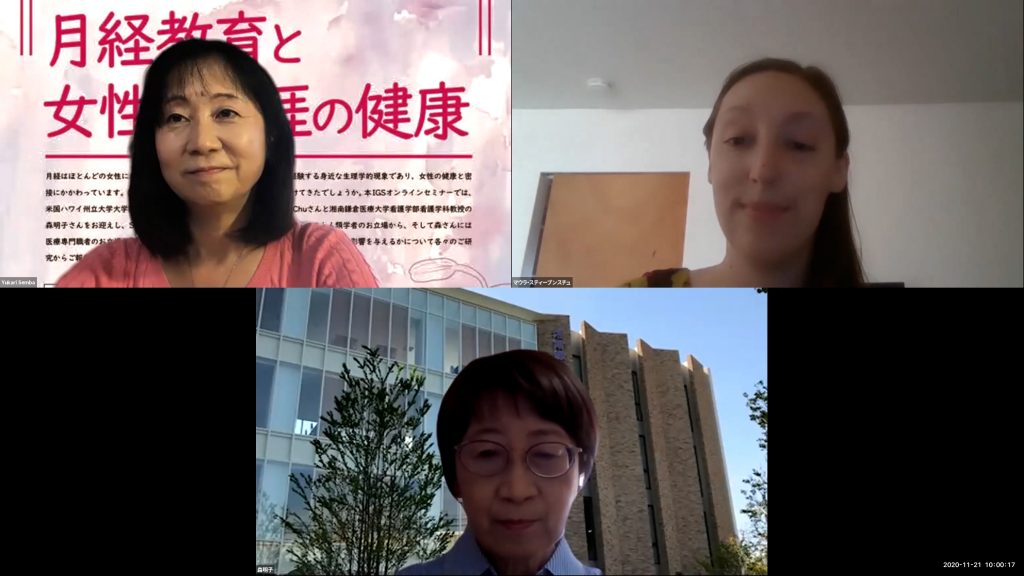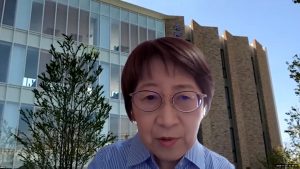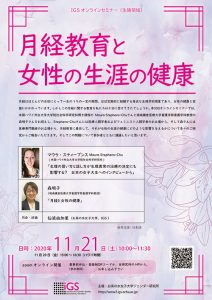【International IGS Seminar】Menstrual Education and Lifelong Health of Women
The seminar on the theme of menstruation education and women’s lifelong health was held online on.

From the fall of 2017 to the summer of 2018, Stephens-Chu resided in Tokyo as a research fellow of the International Foundation Japan 2017 and an affiliated researcher of the Institute for Gender Studies at Ochanomizu University and conducted the research for her dissertation. She interviewed female college students, a sanitary goods company, and others in Tokyo. In this seminar, she introduced Japanese female college students’ experiences related to menstruation and the survey results of the sanitary napkin industry
from her journal article “From Sacred to Secret: Tracing Changes in Views of Menstruation in Japan” in Silva Iaponticarum (Summer/Autumn 2019). She mentioned that menstruation was strongly linked to fertility.
 In Japan, fertility and motherhood are traditional markers of women’s success. Many of the female college students thought that a “normal” menstrual cycle with a regular pattern was a sign of good reproductive and general health and that an irregular menstrual cycle could be a bad sign that signaled fertility
In Japan, fertility and motherhood are traditional markers of women’s success. Many of the female college students thought that a “normal” menstrual cycle with a regular pattern was a sign of good reproductive and general health and that an irregular menstrual cycle could be a bad sign that signaled fertility
problems. Notably, when the female college students had menstrual problems, not all of them visited medical facilities. Stephens-Chu found that in the women’s responses to these issues, their level of concern and the type of treatment they sought were extremely varied. Next, on the basis of her analysis, she proposed that the differences in their responses and decision making when they had problems were related to menstrual education. She concluded that a social atmosphere where people cannot talk openly about menstruation might result in women’s hesitation to visit a medical facility even when they are anxious about menstrual problems, delaying treatment. Thus, women’s lifelong health is affected.
 The second speaker, Akiko Mori, explained the medical aspects of menstruation as a nursing expert in the field of reproductive health, especially infertility. Next, she introduced many survey results, for example, a survey on the effects of menstruation and high school athletes on competitive performance, the effects of menstruation on nursing college students on academics, and the effects of menstrual symptoms of working
The second speaker, Akiko Mori, explained the medical aspects of menstruation as a nursing expert in the field of reproductive health, especially infertility. Next, she introduced many survey results, for example, a survey on the effects of menstruation and high school athletes on competitive performance, the effects of menstruation on nursing college students on academics, and the effects of menstrual symptoms of working
nurses on work. She also introduced how menstrual problems affect women’s lives and how women were managing them. She also referred to educational needs regarding menstruation in terms of educational programs by introducing the effects of menstrual education for high school students and education for controlling menstrual pain for college students. Finally, she talked about her current research project: a research on adult female patients’ experiences with endometriosis by Grant-in-Aid for Scientific Research by the Ministry of Education, Culture, Sports, Science, and Technology. She found that their delay in starting treatment for endometriosis was related to experiences with menstrual education. In other words, menstruation is deeply related to human reproduction. In conclusion, she asked two questions: how menstrual education should be modified to promote women’s health and how it should be structured and implemented.
November 21, 2020. Maura Stephens-chu and Akiko Mori focused on menstrual education and talked about how it affects women’s lifelong health.
After the presentations, the participants had many comments and questions. Our discussion at the seminar was fruitful.
Report by Yukari SEMBA
Project Research Fellow, IGS, Ochanomizu University
|
《Event Details》 【Date/Time】November 21st, 2020, 10:00–11:30 (JST)/November 20th, 2020, 15:00–16:30 (HST) |


